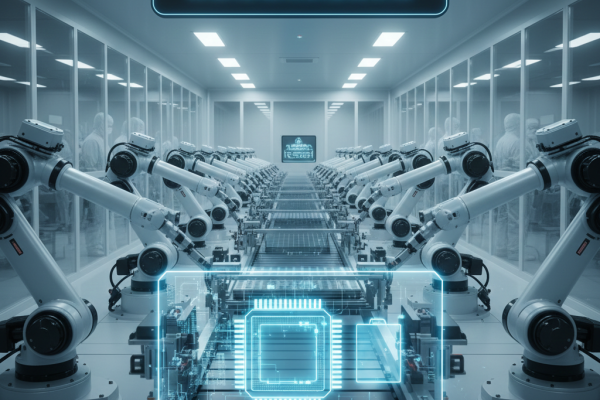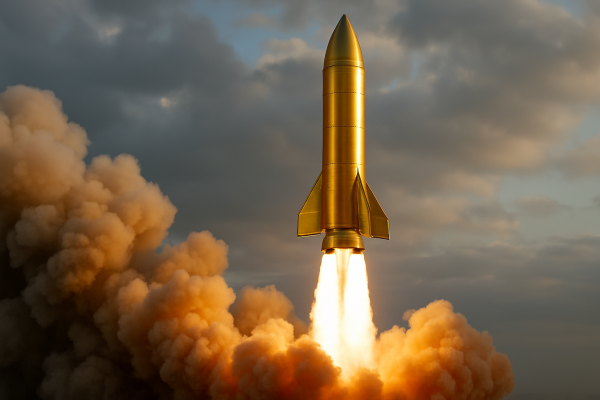March 21st, 2025 | 07:00 CET
BYD, Volkswagen, First Phosphate: Who will shape the future of batteries?
China's electric giant BYD is outpacing Volkswagen. With 322,846 vehicles sold in February 2025, the Chinese automaker is putting the competition under pressure. In addition, Volkswagen continues to lose ground in China, facing a meager profit margin of just 5.9%. The race for e-mobility supremacy is bringing more players into the game: First Phosphate, a Canadian explorer, reports progress in the extraction of high-purity phosphate for lithium iron phosphate batteries. BYD is successfully using these raw materials in its innovative Blade Battery. Volkswagen also aims to score points with electric vehicles and strike back with the ID. EVERY1 model for around EUR 20,000 from 2027. However, access to raw materials remains the ultimate challenge. First Phosphate could become the bottleneck: With the coveted raw material phosphate, the Company could generate USD 700 million in cash flow in three years according to the PEA and thus become a key partner in the battery supply chain. Will this make a Canadian raw materials supplier the secret winner? Investors should follow developments closely.
time to read: 5 minutes
|
Author:
Juliane Zielonka
ISIN:
BYD CO. LTD H YC 1 | CNE100000296 , FIRST PHOSPHATE CORP | CA33611D1033 , VOLKSWAGEN AG VZO O.N. | DE0007664039
Table of contents:

"[...] Silumina Anodes® is a ceramic-coated graphite/silicon anode composite material that we plan to produce in Schwarze Pumpe, Saxony. Here, we aim to supply manufacturers of batteries for e-cars with an application-ready drop-in technology that is low-cost, high-performance and safe. [...]" Uwe Ahrens, Direktor, Altech Advanced Materials AG
Author
Juliane Zielonka
Born in Bielefeld, she studied German, English and psychology. The emergence of the Internet in the early '90s led her from university to training in graphic design and marketing communications. After years of agency work in corporate branding, she switched to publishing and learned her editorial craft at Hubert Burda Media.
Tag cloud
Shares cloud
BYD breaks sales records and soars with DJI: The future of mobility is picking up speed
Chinese electric vehicle giant BYD reported solid figures: In February 2025, the Company sold 322,846 vehicles worldwide, an increase of 8.9% from 296,446 units in January. Exports are also soaring: With 67,025 vehicles delivered, exports rose by 187.8% compared to the previous year. (link: https://carnewschina.com/2025/03/01/byds-export-hit-a-record-high-surging-189-in-february-company-sold-322846-vehicles-globally/ text: In January and February, BYD exported a total of 133,361 vehicles, an increase of 124% over 2024.
A new wave of innovation comes from the partnership with drone manufacturer DJI. Together, they have developed the "Lingyuan" system, an intelligent, vehicle-mounted drone system that transforms vehicles into mobile platforms for exploration and entertainment. Unveiled in Shenzhen, drones can take off and land directly from the vehicle, with real-time video transmission and rapid charging. BYD CEO Wang Chuanfu emphasized that this integration of automotive and drone technology will redefine mobility. DJI President Luo Zhenhua added that the technology is intended to be accessible to the masses, not just an exclusive minority.
With the innovative Blade Battery, BYD is showing that it is shaping future mobility. The special feature lies in the design: instead of several small cells, long single cells are inserted directly into a battery pack (cell-to-pack technology). The cell housing is made of aluminum. This concept increases space utilization by over 50% compared to conventional LFP block batteries. BYD avoids expensive materials such as cobalt and nickel, which reduces costs and promotes sustainability.
Despite its success, geopolitical tensions, such as new trade tariffs, could slow BYD's plans, especially in North America. Nevertheless, the Company remains focused: As of April 2022, BYD only produces "New Energy Vehicles" (BEVs and PHEVs), with 42.3% of sales in 2024 being pure electric vehicles and 57.7% plug-in hybrids.
Volkswagen in crisis: Fighting back with ID. EVERY1 against BYD and Co.
Falling sales in China, high energy and labor costs in Germany, and the pressure from Asian competitors like BYD have caused Volkswagen's net profit in 2024 to shrink by 30.6%. Profit after tax plunged from EUR 17.8 billion in 2023 to EUR 12.3 billion in 2024. While BYD shines with over 322,000 vehicles in February 2025 and First Phosphate secures the future of batteries with high-quality phosphate, VW struggles with a weak operating margin of 5.9%. However, brand manager Thomas Schäfer remains optimistic according to BILD and is counting on a turnaround – with affordable electric vehicles and lean production.
The hopeful candidate is the ID. EVERY1 model, an electric vehicle priced around EUR 20,000, is set to roll off the production line in 2027. Schäfer emphasizes, "We will bring it exactly when the technology is right." This refers to the falling battery costs thanks to LFP cells from PowerCo, which are produced in their factories in Salzgitter, Valencia, and St. Thomas. However, production will not take place in Germany – small vehicles are too expensive to produce here, according to Schäfer.** Instead, VW is looking for low-cost locations in Europe.
Whether the strategy will pay off remains uncertain. Because 2027 could be too late if BYD and French colleague Renault (with the R5) continue to conquer the market at this rate. In addition, Trump's trade tariffs in North America are also threatening VW. However, Schäfer wants to avoid further cost-cutting measures and is focusing on efficiency. Agreements with the works council should reduce costs without cutting too many jobs at Volkswagen.
For 2025 VW expects a margin of 5.5 to 6.5%, despite high investments in electric vehicles and batteries. VW will have to deliver faster and perhaps sacrifice its German thoroughness in order to avoid finishing in the lower ranks in the race for electric mobility.
First Phosphate: Canada's raw materials hope for the LFP battery future
The Canadian company First Phosphate specializes in the extraction and purification of phosphate for lithium iron phosphate (LFP) batteries. It is on the verge of a breakthrough in the North American battery industry. This includes the successful completion of the preliminary economic assessment (PEA) for the Bégin-Lamarche project in the Saguenay-Lac-St-Jean region of Québec. With a planned annual production of 900,000 tons of high-purity phosphate concentrate over 23 years, First Phosphate could supply enough raw material for 350 GWh LFP batteries.
This amount is sufficient to electrify 50% of all vehicles in North America. LFP batteries already dominate 70% of the market in China. First Phosphate's location advantage is enormous. Only 50 km from Alma, an industrial hub with the renowned mining company Rio Tinto as a neighbor, the Company benefits from existing infrastructure such as a rail network, roads, and a deep-sea port in Saguenay, only 70 km away. The region also offers an abundant labor supply and hydroelectric power, making production sustainable and cost-efficient. With a net present value (NPV) of CAD 2.1 billion, the project is extremely attractive economically. Purchase agreements with partners such as Prayon of Belgium and the American Battery Factory already secure 25% of production.
CEO John Passalacqua plans to integrate the entire value chain: from mine to LFP cathode material. Pilot projects have already shown that this is feasible without technological risk. Amid global raw material scarcity and geopolitical uncertainties, First Phosphate can grow to become a strategic supplier for electric mobility in North America and Europe. Experts see phosphate as the second most important material for the battery future, after copper – and First Phosphate is poised to fill the void.
BYD is further expanding its leading position in e-mobility, with 322,846 vehicles sold in February 2025 and an 187.8% export boom. The partnership with DJI for the "Lingyuan" drone system demonstrates innovative strength, but geopolitical tensions could slow down the expansion course. With the Blade Battery, BYD remains a big step ahead of its competitors. Volkswagen is in crisis: weak sales in China and an operating income margin of 5.9% are putting the Company under pressure. The EV called ID. EVERY1, priced at EUR 20,000, is scheduled to come onto the market in 2027, but whether this time is enough, given the lightning-fast pace of competitor BYD, remains to be seen. VW aims to regain its market power with LFP batteries from PowerCo in Salzgitter, Germany, and efficiency increases – but tariffs and high production costs pose risks. First Phosphate is moving into a key strategic position for the North American and European battery future, with 900,000 tons of phosphate annually for LFP batteries. The location advantage in Québec and already signed offtake agreements ensure stability. In a market hotly contested by BYD and VW, First Phosphate could score with its raw material advantage, as experts view phosphate as the second most important raw material after copper. Investors should closely examine the energy producers at the start of the supply chain.
Conflict of interest
Pursuant to §85 of the German Securities Trading Act (WpHG), we point out that Apaton Finance GmbH as well as partners, authors or employees of Apaton Finance GmbH (hereinafter referred to as "Relevant Persons") may hold shares or other financial instruments of the aforementioned companies in the future or may bet on rising or falling prices and thus a conflict of interest may arise in the future. The Relevant Persons reserve the right to buy or sell shares or other financial instruments of the Company at any time (hereinafter each a "Transaction"). Transactions may, under certain circumstances, influence the respective price of the shares or other financial instruments of the Company.
In addition, Apaton Finance GmbH is active in the context of the preparation and publication of the reporting in paid contractual relationships.
For this reason, there is a concrete conflict of interest.
The above information on existing conflicts of interest applies to all types and forms of publication used by Apaton Finance GmbH for publications on companies.
Risk notice
Apaton Finance GmbH offers editors, agencies and companies the opportunity to publish commentaries, interviews, summaries, news and the like on news.financial. These contents are exclusively for the information of the readers and do not represent any call to action or recommendations, neither explicitly nor implicitly they are to be understood as an assurance of possible price developments. The contents do not replace individual expert investment advice and do not constitute an offer to sell the discussed share(s) or other financial instruments, nor an invitation to buy or sell such.
The content is expressly not a financial analysis, but a journalistic or advertising text. Readers or users who make investment decisions or carry out transactions on the basis of the information provided here do so entirely at their own risk. No contractual relationship is established between Apaton Finance GmbH and its readers or the users of its offers, as our information only refers to the company and not to the investment decision of the reader or user.
The acquisition of financial instruments involves high risks, which can lead to the total loss of the invested capital. The information published by Apaton Finance GmbH and its authors is based on careful research. Nevertheless, no liability is assumed for financial losses or a content-related guarantee for the topicality, correctness, appropriateness and completeness of the content provided here. Please also note our Terms of use.




